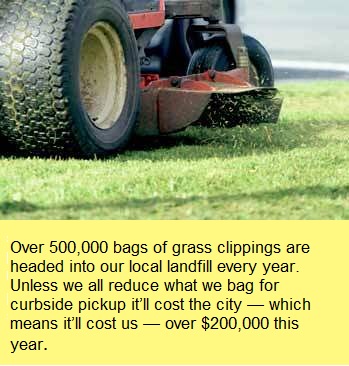Composting
Residents can recycle
|
FORT WAYNE BIOSOLIDS HANDLING FACILITY |
REPUBLIC SERVICES 6231 MacBeth Road Fort Wayne, IN 46809 Phone: (260) 747-4117 Hours: Mon-Fri 8am-5pm, Sat. 8am-12 noon |
Minimal fees apply at both locations. Materials accepted include: leaves, garden waste, prunings, vines, grass, brush and weeds. Materials NOT accepted include: cement, dirt, lumber, railroad ties, wooden pallets, construction debris, fruit from trees, wood fencing, tires and bushes with roots.
What is Grasscycling?
Grasscycling is the natural recycling of grass by leaving clippings on the lawn when mowing. Grass clippings are 75-85% water, so they decompose quickly, returning valuable nutrients back into the lawn.
Benefits:
- Reduces time spent mowing and maintaining your lawn
- Prevents common turf diseases
- Reduces the need to fertilize, as 50% of your lawn's fertilizer needs are met
- Does not cause thatch--in fact, helps prevent it
- Makes turf greener and tougher
- Cuts down on watering needs and costs Eliminates disposal of grass clippings
(and sometimes leaves too)
Mowing
Mow your lawn when the grass is dry and keep mower blades sharp. Mow often enough so that no more than 1/3 the length of the grass blade is cut in any one mowing.
Clean-Up
When grass clippings are washed into a storm drain, they can clog the drain. They also carry lawn chemicals into waterways. After mowing, sweep or blow grass clippings from the street or sidewalk back onto the lawn to help reduce water pollution.
Watering
If you water, do so early in the morning to reduce evaporation and prevent disease. Deep, infrequent watering produces a stronger, more extensive root system. Lawns watered too frequently can develop shallow root systems that make the grass more susceptible to stress and disease. During prolonged dry weather grass may look dead. In fact it is probably just dormant and will turn green again when temperatures drop and it rains.
Fertilizing
Chemical fertilizer and other lawn care products are carried by rain water runoff into nearby ponds, streams and rivers possibly causing algae blooms and fish kills. Before applying fertilizer, test your soil to find out if additional nutrients are needed. Test kits are available at local hardware stores, home supply stores and on line. If you do decide to use chemical fertilizer, use a product containing LOW or NO phosphorus. Apply fertilizer according to package directions for moderate, even growth. Over fertilizing can weaken your lawn by causing excessive top growth, making the lawn more prone to disease.

